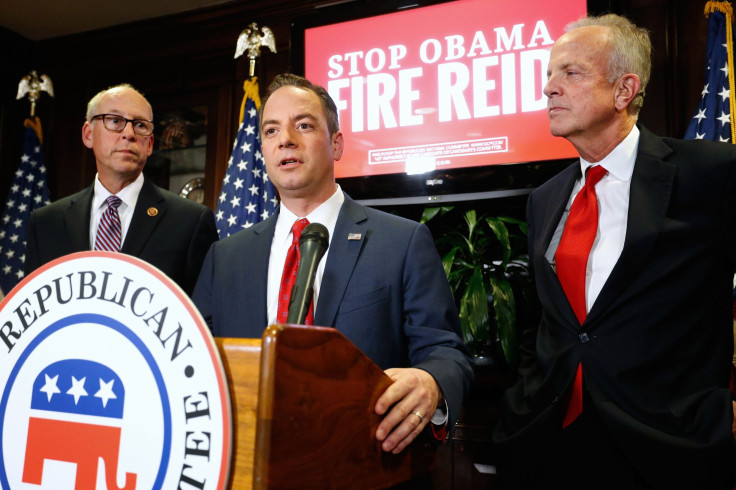Republican Moderates And Tea Partiers Are Already Squabbling

WASHINGTON – In separate press conferences, two miles and as many hours apart, signs of GOP intraparty tension were already starting to show. Less than a day after Republicans swept to take control the Senate, it was clear that battles over health care law, immigration and spending could split the party.
Wednesday's first press conference, in a packed room at the Republican National Committee headquarters in the afternoon, showcased party leaders trying to set a statesmanlike tone for the GOP-controlled Congress. The conversation was about the challenges of power, about achieving real progress on issues like tax reform and entitlements.
“We know that we have to get to work doing the governing piece. Our party ultimately will be measured by how we govern,” said Rep. Greg Walden, who headed the GOP House campaign committee. “We are eager to get to work.”
A couple of hours later in a half-empty room at the National Press Club, leaders of several conservative groups -- including Citizens United, Family Research Council and For America -- held their own press conference in order to deliver a stern warning to officials in their own party: Republicans made campaign promises, like repealing the Affordable Care Act, and they'd better stick to them.
“No Republican ran on a platform of cooperation, consolation and compromise with [President] Obama,” said Richard A. Viguerie, a longtime conservative fundraiser who now runs ConservatieHQ.com. “Today, the Republican Party is still very much divided.”
To win on Tuesday, Republicans moderated some of their rhetoric on social issues and, after primary battles, united behind GOP nominees. That temporarily quieted talk of a GOP civil war. But the image of party solidarity is hard to sustain if Republicans can't get through one day without press conferences that send contradictory messages.
Looking ahead to 2016, the Republican establishment hopes to focus on passing legislation that they can campaign on. Conservatives, who say it was their activists who ensured victory for the GOP, have their own agenda.
“I want to make sure that the Republicans hear what these conservatives are talking about because it is those promises that we made last night, it is the promises that the candidates made that they have to live up to,” said David Bossie, president of Citizens United.
Obamacare is likely to be the first issue to crack the party's fragile detente. The GOP leadership will probably give conservatives what they've been clamoring for, a vote on the full repeal of the law. Obama will veto it. Then what? Moderates would probably like the issue to fade away, while conservatives are already agitated that their fellow Republicans won’t continue the fight.
Tea Party Patriots President Jenny Beth Martin, whose organization helped mobilize voters in the 2010 campaign, bristled at Speaker John Boehner’s election-night press release. Boehner mentioned a number of issues on his agenda -- redoing the tax code, taking a hard look at spending, reforming the legal system, addressing regulations and making changes to the education system.
“Obamacare is mentioned nowhere,” Martin said. “We will hold them accountable. We are watching what they do. We expect them to live up to their promises.”
Kansas Republican Sen. Jerry Moran, who headed the National Republican Senatorial Campaign, was more tempered about any attempt to undo the Affordable Care Act during the lame duck session. Congress will have to pass a spending bill before Dec. 11 to prevent a government shutdown, and Republicans will have to sort out how to handle funding for the health law in the process.
“I think at this moment the issue is one for the House of Representatives, not the Senate,” Moran said.
The differences within the GOP are equally stark on the issue of immigration. Obama is vowing to press forward with executive actions to accomplish some of the goals set out in the comprehensive reform bill that passed in the Senate last year but gained no traction in the House.
Establishment Republicans have identified immigration as a key to helping the party appeal to Latino voters in 2016. “The idea of serious immigration reform is still alive and is something the American people need,” Republican National Committee head Reince Priebus said. He cited Sens. Marco Rubio and Rand Paul as supporters of reform.
“Secure the border and block the president’s planned illegal amnesty,” Martin said.
Economic issues are no less contentious. Moran has said that tax reform could be an area for bipartisan agreement, citing Sen. Ron Wyden’s work on crafting a comprehensive reform of the code.
“I think there is still a huge opportunity for the senate to find common ground on tax reform,” Moran said.
But conservatives say nothing is more important than dismantling the ACA.
“I heard one of the Republican leaders on TV say, ‘I don’t know if we’re going to be able to repeal Obamacare because we need to go first and foremost and fix the economy,’” Bossie said. “Repealing Obamacare is fixing the economy.”
The midterm battle, like many wars, brought factions together against a common enemy. After a victory comes the hard part.
© Copyright IBTimes 2025. All rights reserved.






















